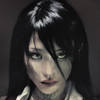Yeule on the Music They Want to Soundtrack Their Funeral
The cybergoth star waxes philosophical on death, drugs, and sobriety—and details how they want their life to be celebrated with a furry-filled battle royale.

Existential Playlist is an interview series where artists tell us about the music they want played at their own memorial service, delving into some of life’s biggest questions along the way. (Note: The following article discusses suicidal ideation and substance use disorder.)
Yeule is sitting in the middle of a dim, blood-splattered corridor, nonchalantly chewing a stick of gum. Their grim virtual background for our video call is sourced from the horror game series Silent Hill, one of many inspirations that inform their wonderfully diabolical creative universe. That elegant hellscape expands in ambitious new directions in the music, artwork, and videos for their new album, Evangelic Girl Is a Gun. Across the record’s visuals, the Singapore-raised, Los Angeles-based artist stars as several gothic, weapon-wielding heroes and villains, all soundtracked by songs that flit between trip-hop, electro-pop, and alt-rock. In an era where every musician seems to be “worldbuilding,” Yeule actually gets the job done, bringing you deep into their anime-addled brain with every eye-exploding look and ear-piercing hook.
Death is always lurking around the corner in Yeule’s work. Sometimes they treat the topic drolly, like a gamer racking up quick kills; sometimes it can feel deeply mournful. The same dynamic plays out in our conversation about the songs they would want played at their imagined funeral. On one hand, they are casual about their inevitable end. “Once I’m dead, I’m just dead,” they shrug. “I won’t be able to see it, so it’s whatever.” But when I ask about the meaning of death as it’s portrayed in their music and videos, they get more philosophical—and more personal.
“I’ve struggled with suicidal ideation and have had a hard time dealing with living,” they explain. “I had major depressive disorders when I was younger and I was unmedicated and didn’t know how to deal with those things, so it was a very sweet thought to have a memento mori. However, the representation of death that you see in all of my videos is not necessarily the common trope of glamorization. It could be something to do with rebirth, or killing a part of yourself, or a darkness that lurks underneath what you are. Metaphors of death and rot are very beautiful, because they signify how we have a time limit to our mortality, and that’s what makes living worthwhile.”
At 27, Yeule has already seen several friends pass away from drug overdoses, and they have struggled with addiction as well. There have been moments when they thought they might die. They recall one particularly dire instance when they were in such a state that they left a voicemail on their manager’s voicemail saying, “This is a password to my laptop. You will find a big hard drive on my table, it contains all of my archive of works, and you will find it on the cloud as well.” The manager was rightfully terrified, and Yeule apologized. “I’m really glad that I’m in a much better place now and that I can talk about it, because I feel like there’s a lot of people struggling with addiction who don’t feel seen enough.”
When we talk in April, Yeule has been sober for 150 days. “I plan on keeping sober,” they say. “It’s a huge change in my life. Every day it gets easier.”
When considering what to pick for their Existential Playlist, Yeule thought back to when one of their best friends passed away when he was just 18. “He was queer, and his funeral was very much directed by his family, who didn’t really know him the way his friends knew him,” they recall. “We were all subdued, and I just remember thinking, Bitch, he would want this to be a party.” In that celebratory spirit, here are Yeule’s picks.




